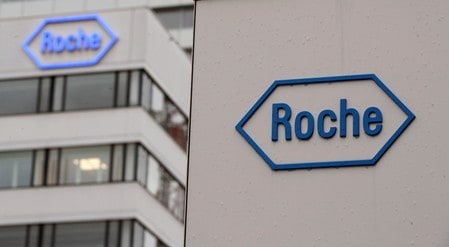By John Miller
ZURICH (Reuters) – Swiss drugmaker Roche’s push into personalized cancer medicines hit a milestone on Tuesday with Japanese approval of a new drug, Rozlytrek, that targets patients who must be identified via genetic profiling.
Japan is the first country to give its blessing to Rozlytrek, also known as entrectinib, targeting people with NTRK fusion-positive solid tumors, across 10 different tumor types including breast, colorectal, neuroendocrine, lung and pancreatic cancers.
Rozlytrek aims to treat people with a rare genetic anomaly, called NTRK fusions, that drive growth in a range of tumors found throughout the body. This approach, where prospective patients must be identified via a biomarker test, is a departure from an era when doctors treated patients based on where the tumor occurred in the body.
While positive news for Roche, the Basel-based company has been beaten to the regulatory finish line in this emerging area: German drugmaker Bayer’s Vitrakvi has already won U.S. backing for solid tumors that test positive for NTRK genes. Roche has yet to get U.S. and European approvals.
“Today’s approval of Rozlytrek represents a new chapter in personalized healthcare, applying advanced diagnostics to deliver precision medicines,” said Sandra Horning, Roche’s chief medical officer, adding she hopes for approval elsewhere “as soon as possible”.
On their own, NTRK fusions are so rare that doctors are not likely to run dedicated tests for each. But since they occur in a multitude of tumors, Roche sees potentially broad application for Rozlytrek, in conjunction with companion diagnostic tests from its Foundation Medicine unit.
Roche is also testing Rozlytrek in cancers with additional genetic anomalies.
(Reporting by John Miller; Editing by Michelle Martin)


